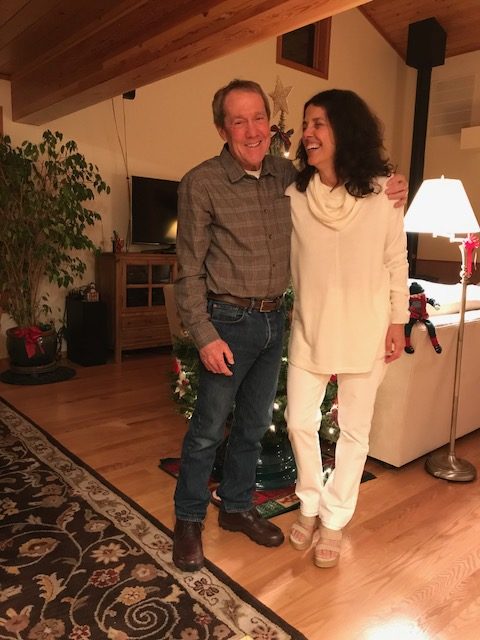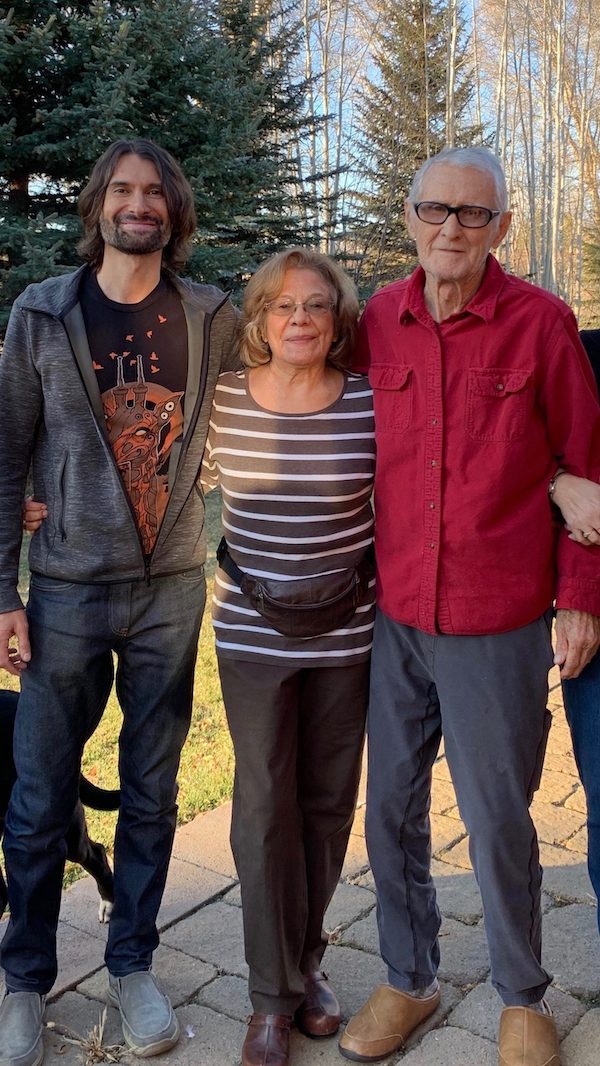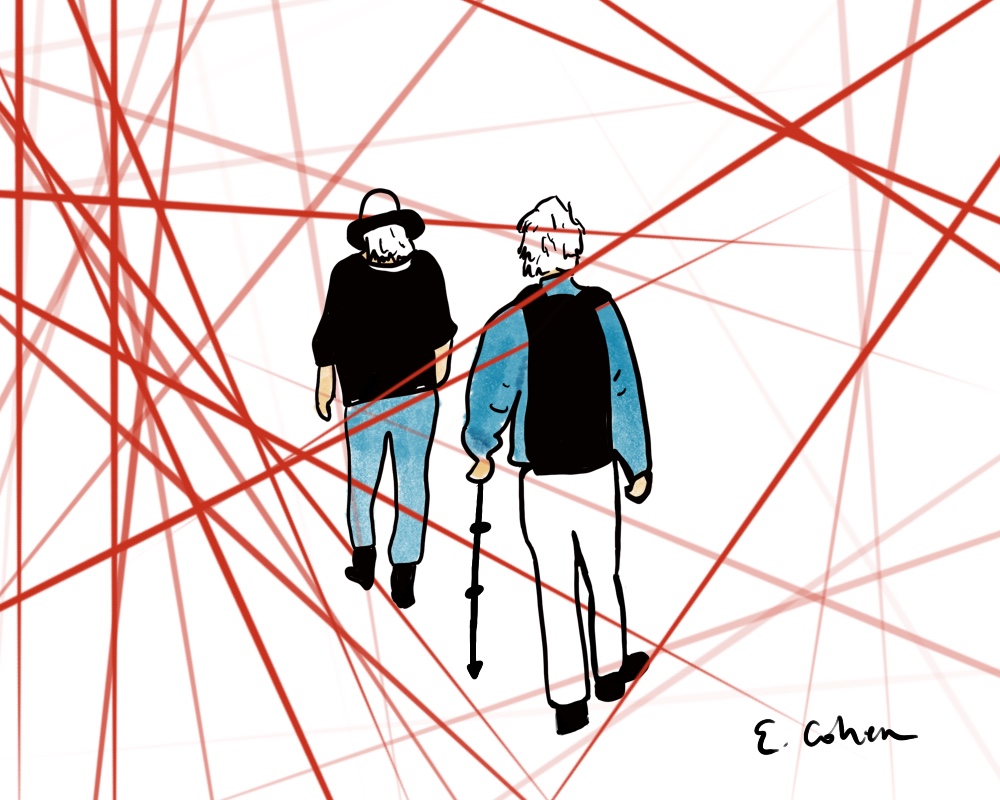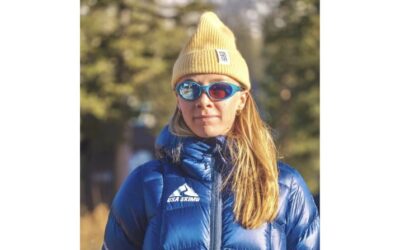Amid the uncertainty of the COVID-19 pandemic, Jeri Calabrese, 67, and her husband Mike, 70, are just “trying to live our lives as best we can.” That means getting out for fresh air and exercise as much as possible. One recent morning, they were headed out on a drive to see the changes of early spring in the Wind River mountains. Jeri says they are concerned and taking all the recommended precautions they can. Life is a balancing act now: caution versus calm.

Mike and Jeri Calabrese are in the high-risk category when it comes to COVID-19. They say they’re balancing this notion with as much calm and sense as they can. (Courtesy photo)
Adults over 65 are at a dramatically increased risk for severe illness from COVID-19. The numbers are sobering. According to the Centers for Disease Control and Prevention, adults in this age range comprise eight out of 10 COVID-19-related deaths in the U.S.
Very healthy seniors are still at higher risk simply because of age. “You can be the healthiest 65-year-old in the world and still get critically ill,” Dr. Jim Little Jr. said.
Because Jackson’s senior population tends to be healthier and more active, they may find it tough to stay inside. These are “not normally sedentary” people, Little said. Most seniors he has spoken to, however, are adapting to the isolation requirements.
“Self-isolation is critically important. That’s how we will keep healthy people healthy,” Little said. He cautioned that “even cheating once a week dramatically increases risk.”
Social isolation, however, presents obvious challenges to staving off loneliness. And loneliness can have negative impacts on health. According to a 2010 national survey by AARP, loneliness was a significant predictor of poor health in people 45 years and older. To that point, Little encourages seniors to keep up social connections virtually. “Use video chats, or even just phone calls on a regular basis.”
From Polio to COVID
Jackson resident Joan Blatt, 75, says she doesn’t identify with the term “senior.”
“I feel strong and healthy. I simply can’t internalize being defined as a senior.”
Still, she and her partner are following all the prevention guidelines, including having their groceries delivered and practicing stringent social distancing. “It is giving me a sense of peace,” Blatt said. “I am controlling what I can control, which makes it easier to face the part I can’t control.”
Calabrese also says adopting a sense of perspective helps.
“We are not blasé about it, but we have faced life-threatening health issues before in our life together, so perhaps that gives us a different point-of-view,” Calabrese said.
Eighty-nine-year-old Jeanine Mayer has seen other epidemics come and go in her lifetime. Mayer remembers when polio spread through the valley in the early 1950s and killed residents. “It was pretty scary at the time because we didn’t know what caused it,” Mayer said. “The schools were closed for two weeks.”
That’s the kind of life experience that is helpful now, said Malenda Hoelscher, executive director of senior living at St. John’s Living Center.
“This is a generation that went through the Great Depression and World War II. They have a lot of resilience,” she said. And that dictates their “we will get through this if we use common sense” attitude.
Blatt says her peers are taking the health threat seriously. She is more concerned about the attitude of Governor Mark Gordon, who she feels is doing the bare minimum. “I wish he would enact a mandatory two-week quarantine for people coming in from out-of-state. My concern is about the second homeowners flying in on private planes.”
(The governor has issued statewide shutdowns of nonessential services but has yet to order a statewide “shelter-in-place” mandate.)
Mayer is happy to abide by the county’s order that banned all gatherings of people outside their homes, one that officials say should be treated as a “stay-at-home” measure. She stays in touch with family and friends by phone. Upbeat by nature, Mayer says she is doing well. “I don’t go many places anymore, so this hasn’t affected me much at all.”
But not all seniors have had an easy time cutting off their engagement with the community. Before the countywide order, some residents at Legacy Lodge chose to maintain jobs and social connections outside the boundaries of the residence facility. But if they did so, they had to quarantine themselves when they were in their apartments.
Executive director Miekka Zanders helped these residents weigh the costs and benefits. “It was a tough decision because if they kept their jobs or social life, that created social isolation here at Legacy. But on the other hand, they were getting engagement outside of here.”
Coming Together (and Staying Apart)
Mayer relies on the Senior Center of Jackson Hole for lunches—and her daily crossword. The center “is one of the best things ever to happen in Jackson,” she said.
Though the Senior Center had to close its doors to large gatherings, it provides an essential lifeline during this crisis. In addition to Meals on Wheels for breakfast and lunch, the center is offering curbside meal pick up as well. Senior Center staff are still doing home visits where necessary, and they’ve added in daily calls to people living alone.
“We are trying to keep people engaged and active,” Senior Center assistant director Rebecca Erskine said.
Meanwhile, fitness classes have been canceled as well as the in-house meal program. The center’s library and computer room are still open by appointment on a one-by-one basis.
The center also supports people caring for aging family members. Sixty-one-year-old Cristina Campos cares for her 80-year-old father-in-law David Ivan Basye. They receive Meals on Wheels lunches—a daily highlight.
“It fills me with so much joy to see how much my father-in-law enjoys the meals,” Campos said. “He always says, ‘Wow,’ when they bring lunch.”
Campos’ situation speaks to a wider phenomenon—people in their 60s and 70s caring for older relatives or spouses. This is true for 75-year-old Carmina Oaks, a well-known community leader who cares for her 85-year-old husband.

Carmina and John Oaks, married 48 years, with their son Michael Oaks. Carmina is the primary caregiver for John and worries about his age and susceptibility to COVID-19. (Courtesy photo)
She is worried about her husband’s age and health issues so they’re doing what they can, following recommended social distancing guidelines and wearing masks when they go out for walks in their neighborhood. Oaks is fastidiously cleaning and sanitizing her home too. “I have a little bear on my front porch. He wears a mask and holds hand sanitizer for people to use before they come inside,” Oaks said.
Like Mayer and Campos, Oaks praised local social service organizations serving seniors and people across the community, like the Jackson Hole Cupboard.
She also pointed to the Community Foundation, which raised $1.4 million to support local nonprofits helping people impacted by COVID-19. A portion of those funds was directed to One22’s COVID-19 financial relief awards, which individuals can apply for directly.
But Oaks fears that some Latinx people may not be reaching out for help because of language barriers or fears about immigration status. She often receives calls asking for help with translation or health care decisions. Each time she redirects people to the Spanish language services available at One22 where she was a case manager until she retired last year.
Another resource for seniors is the new Teton County Sheriff’s Office prescription delivery service. Deputies are delivering medications to county residents age 60 or older and they say demand for this service is rising. Lieutenant Lloyd Funk said as of Tuesday they had more than 50 calls for delivery.
Funk emphasized that all seniors are welcome. In other words, Latinx residents should not be afraid of immigration status. “We have policies against that,” he said. “We are here to take care of those in Teton County. There is no stipulation as to who you are.”
Providers Feel the Pinch

Older people in Jackson Hole told KHOL they have lived through historical events that lend them perspective in the face of COVID-19. (Emily Cohen)
For seniors living in assisted living facilities like Legacy Lodge and the St. John’s Living Center, full-time care is built into their daily lives. However, fears of community spread weigh heavy on the minds of the staff and directors of such facilities. They’ve implemented CDC guidelines to ensure as much safety as possible. That includes restricting almost all outside visitation, canceling all group activities and communal dining, and screening everyone—residents and staff—for fever or respiratory symptoms.
Legacy Lodge executive director Miekka Zanders said her staff are under a lot of stress trying to keep their clients free from the virus and feel “an intense sense of responsibility—we don’t want to spread the virus. All health care providers are feeling that concern right now.”
Legacy Lodge has suspended all visitors to their building. Instead they have turned to video chats and other means of keeping residents connected to their families and friends.
“It’s very scary for our residents,” Nikki Escalada, director of life enrichment, said. Though residents remain hopeful, Escalada said people are fearful “that COVID will end up in our building. The statistics are not in their favor.”
Cheryl Sawyer, director of nursing at the Living Center said they, too, are abiding by all the CDC guidelines. She said transparency goes a long way to calming fears and creating trust. “Our approach with this pandemic is to share the same message with staff, residents and their families.”
Currently there are 38 patients at the Living Center. Life enrichment director Connie Hansen says she and her staff have pivoted quickly to provide safe activities and engagement opportunities for patients.
Because they are no longer eating together in the dining room, The Living Center added “tray brighteners” to patients’ in-room lunches. Hansen said everyone received a fresh flower on their tray on the first day of spring. Other times, it’s jokes, candy or cards.
Legacy Lodge has also been thinking about ways to brighten their residents’ days. Before the county health order was enacted that bans people from gathering with those outside their household, Escalada launched a series featuring musicians who played outside the lodge’s windows for residents to hear. Performers included Peter Keenan, Peter Chandler, Dan Hady and Michael Batdorf.
Now Escalada is thinking about other ways to creatively connect seniors to the community. The residents at Legacy Lodge are always on her mind, she said. It’s increasingly “tough to walk away when my shift is over.”
Count on KHOL for vital coverage during the COVID-19 pandemic. Your support ensures the future of this essential community service. Become a member today.





